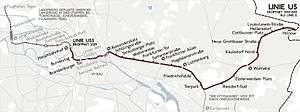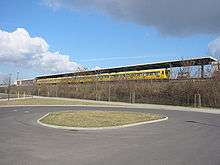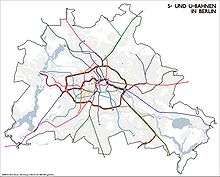U5 (Berlin U-Bahn)
 | |||||||||||||||||||||||||||||||||||||||||||||||||||||||||||||||||||||||||||||||||||||||||||||||||||||||||||||||||||||||||||||||||||||||||||||||||||||||||||||||||||||||||||||||||||||||||||||||||||||||||||||||||||||||||||||||||||||||||||||||||||||||||||||||||||||||||||||||||||||||||||||||||||||||||||||||||||||||||||||||||||||||||||||||||||||||||||||||||||||||||||||||||||||||||||||||||||||||||
| Overview | |||||||||||||||||||||||||||||||||||||||||||||||||||||||||||||||||||||||||||||||||||||||||||||||||||||||||||||||||||||||||||||||||||||||||||||||||||||||||||||||||||||||||||||||||||||||||||||||||||||||||||||||||||||||||||||||||||||||||||||||||||||||||||||||||||||||||||||||||||||||||||||||||||||||||||||||||||||||||||||||||||||||||||||||||||||||||||||||||||||||||||||||||||||||||||||||||||||||||
| System | Berlin U-Bahn | ||||||||||||||||||||||||||||||||||||||||||||||||||||||||||||||||||||||||||||||||||||||||||||||||||||||||||||||||||||||||||||||||||||||||||||||||||||||||||||||||||||||||||||||||||||||||||||||||||||||||||||||||||||||||||||||||||||||||||||||||||||||||||||||||||||||||||||||||||||||||||||||||||||||||||||||||||||||||||||||||||||||||||||||||||||||||||||||||||||||||||||||||||||||||||||||||||||||||
| Locale | Berlin | ||||||||||||||||||||||||||||||||||||||||||||||||||||||||||||||||||||||||||||||||||||||||||||||||||||||||||||||||||||||||||||||||||||||||||||||||||||||||||||||||||||||||||||||||||||||||||||||||||||||||||||||||||||||||||||||||||||||||||||||||||||||||||||||||||||||||||||||||||||||||||||||||||||||||||||||||||||||||||||||||||||||||||||||||||||||||||||||||||||||||||||||||||||||||||||||||||||||||
| Stations |
20 (current) 33 (future) | ||||||||||||||||||||||||||||||||||||||||||||||||||||||||||||||||||||||||||||||||||||||||||||||||||||||||||||||||||||||||||||||||||||||||||||||||||||||||||||||||||||||||||||||||||||||||||||||||||||||||||||||||||||||||||||||||||||||||||||||||||||||||||||||||||||||||||||||||||||||||||||||||||||||||||||||||||||||||||||||||||||||||||||||||||||||||||||||||||||||||||||||||||||||||||||||||||||||||
| Operation | |||||||||||||||||||||||||||||||||||||||||||||||||||||||||||||||||||||||||||||||||||||||||||||||||||||||||||||||||||||||||||||||||||||||||||||||||||||||||||||||||||||||||||||||||||||||||||||||||||||||||||||||||||||||||||||||||||||||||||||||||||||||||||||||||||||||||||||||||||||||||||||||||||||||||||||||||||||||||||||||||||||||||||||||||||||||||||||||||||||||||||||||||||||||||||||||||||||||||
| Opened | 21 December 1930 | ||||||||||||||||||||||||||||||||||||||||||||||||||||||||||||||||||||||||||||||||||||||||||||||||||||||||||||||||||||||||||||||||||||||||||||||||||||||||||||||||||||||||||||||||||||||||||||||||||||||||||||||||||||||||||||||||||||||||||||||||||||||||||||||||||||||||||||||||||||||||||||||||||||||||||||||||||||||||||||||||||||||||||||||||||||||||||||||||||||||||||||||||||||||||||||||||||||||||
| Depot(s) | Hönow | ||||||||||||||||||||||||||||||||||||||||||||||||||||||||||||||||||||||||||||||||||||||||||||||||||||||||||||||||||||||||||||||||||||||||||||||||||||||||||||||||||||||||||||||||||||||||||||||||||||||||||||||||||||||||||||||||||||||||||||||||||||||||||||||||||||||||||||||||||||||||||||||||||||||||||||||||||||||||||||||||||||||||||||||||||||||||||||||||||||||||||||||||||||||||||||||||||||||||
| Events | |||||||||||||||||||||||||||||||||||||||||||||||||||||||||||||||||||||||||||||||||||||||||||||||||||||||||||||||||||||||||||||||||||||||||||||||||||||||||||||||||||||||||||||||||||||||||||||||||||||||||||||||||||||||||||||||||||||||||||||||||||||||||||||||||||||||||||||||||||||||||||||||||||||||||||||||||||||||||||||||||||||||||||||||||||||||||||||||||||||||||||||||||||||||||||||||||||||||||
| Tierpark extension | 6 June 1973 | ||||||||||||||||||||||||||||||||||||||||||||||||||||||||||||||||||||||||||||||||||||||||||||||||||||||||||||||||||||||||||||||||||||||||||||||||||||||||||||||||||||||||||||||||||||||||||||||||||||||||||||||||||||||||||||||||||||||||||||||||||||||||||||||||||||||||||||||||||||||||||||||||||||||||||||||||||||||||||||||||||||||||||||||||||||||||||||||||||||||||||||||||||||||||||||||||||||||||
| Hönow extension | 1 July 1989 | ||||||||||||||||||||||||||||||||||||||||||||||||||||||||||||||||||||||||||||||||||||||||||||||||||||||||||||||||||||||||||||||||||||||||||||||||||||||||||||||||||||||||||||||||||||||||||||||||||||||||||||||||||||||||||||||||||||||||||||||||||||||||||||||||||||||||||||||||||||||||||||||||||||||||||||||||||||||||||||||||||||||||||||||||||||||||||||||||||||||||||||||||||||||||||||||||||||||||
| Extension to Berlin Hauptbahnhof | 2019 (expected) | ||||||||||||||||||||||||||||||||||||||||||||||||||||||||||||||||||||||||||||||||||||||||||||||||||||||||||||||||||||||||||||||||||||||||||||||||||||||||||||||||||||||||||||||||||||||||||||||||||||||||||||||||||||||||||||||||||||||||||||||||||||||||||||||||||||||||||||||||||||||||||||||||||||||||||||||||||||||||||||||||||||||||||||||||||||||||||||||||||||||||||||||||||||||||||||||||||||||||
| Technical | |||||||||||||||||||||||||||||||||||||||||||||||||||||||||||||||||||||||||||||||||||||||||||||||||||||||||||||||||||||||||||||||||||||||||||||||||||||||||||||||||||||||||||||||||||||||||||||||||||||||||||||||||||||||||||||||||||||||||||||||||||||||||||||||||||||||||||||||||||||||||||||||||||||||||||||||||||||||||||||||||||||||||||||||||||||||||||||||||||||||||||||||||||||||||||||||||||||||||
| Track gauge |
| ||||||||||||||||||||||||||||||||||||||||||||||||||||||||||||||||||||||||||||||||||||||||||||||||||||||||||||||||||||||||||||||||||||||||||||||||||||||||||||||||||||||||||||||||||||||||||||||||||||||||||||||||||||||||||||||||||||||||||||||||||||||||||||||||||||||||||||||||||||||||||||||||||||||||||||||||||||||||||||||||||||||||||||||||||||||||||||||||||||||||||||||||||||||||||||||||||||||||
| |||||||||||||||||||||||||||||||||||||||||||||||||||||||||||||||||||||||||||||||||||||||||||||||||||||||||||||||||||||||||||||||||||||||||||||||||||||||||||||||||||||||||||||||||||||||||||||||||||||||||||||||||||||||||||||||||||||||||||||||||||||||||||||||||||||||||||||||||||||||||||||||||||||||||||||||||||||||||||||||||||||||||||||||||||||||||||||||||||||||||||||||||||||||||||||||||||||||||

U5 is a line on the Berlin U-Bahn. It runs from Alexanderplatz in Mitte eastwards through Friedrichshain, Lichtenberg and Friedrichsfelde, surfaces in Biesdorf-Süd to pass Kaulsdorf and Hellersdorf above ground and finally reaches city limits at Hönow.
U5 at present only connects to other U-bahn lines at its Alexanderplatz terminus, although work is ongoing to extend it across central Berlin to Berlin Hauptbahnhof, providing further U-Bahn and S-Bahn interchanges.
History
Only in 1927 did construction start on Pre World War I era plan for a rapid transit line underneath Große Frankfurter Straße (the present-day Karl-Marx-Allee). The design was planned and led by Johannes Bousset.[1] The first section between Alexanderplatz and Friedrichsfelde, then named line E, was inaugurated on 21 December 1930 (However, it is not shown on the Pharus-Plan 1930 map).
During the time when Berlin was divided, the U5 was the only line to fall entirely within East Berlin, and the only line to be actively extended by the East German authorities. Work on this extension was started in September 1969. On 6 June 1973, the first extension was opened, to Tierpark station, serving the Tierpark zoo.
The final extension, partly over the route of an abandoned section of the VnK Railway, to the developing areas in the boroughs of Marzahn and Hellersdorf, went into service on 1 July 1988 (Elsterwerdaer Platz) and 1 July 1989 (Hönow). The last two stations of the extension, Louis-Lewin-Straße and Hönow, were originally located outside Berlin city limit, in Bezirk Frankfurt. The area was joined to Berlin at German reunification in 1990.
At reunification, the line was renumbered as U5 to match the naming system in use in West Berlin. Between January 2003 and December 2004, reconstruction was conducted between Alexanderplatz and Friedrichsfelde in order to repair damage dating back to World War II.
Plans
There have long been plans to extend the U5 westward. The short U55 line opened in August 2009, and runs from Berlin Hauptbahnhof via the Bundestag U-Bahn station to Brandenburger Tor station. The designation of the line as U55 indicates that it is ultimately intended to become part of the U5 line.
Construction of the link to enable this commenced in April 2010 and is expected to be completed by 2019.[2] The link will be 2.2 kilometres (1.4 mi) in length, and connect the Brandenburger Tor terminus of the current U55 to the Alexanderplatz terminus of the current U5. Along its route it will serve new U-bahn stations at Berliner Rathaus, Museumsinsel and Unter den Linden, with the latter providing an interchange with line U6.[3][4]
Further planning
In the long term, there are plans to extend from the line from Berlin Hauptbahnhof, via Turmstraße and Jungfernheide to Flughafen Tegel. This plan was postponed due to the route being too long, the pending closure of Tegel Airport and the poor fiscal position of Berlin. An addition to the plan is extension towards Rathaus Reinickendorf via Scharnweberstraße.
At Jungfernheide, two island platforms were constructed for the planned interchange station between U7 and U5. The finished section is used for firefighting exercises in conjunction with airport security and the BVG. Trains that are used include 2712/2713 ('9 Zoolog. Garten') and 2714/2715 (Jakob-Kaiser-Platz), of which they were vandalised with legal spray painting. During the opening of 1980, Jungfernheide was in a deadlock because of the Berlin Wall, that prevented U5 from extending towards the west.
References
- ↑ Schwenk, Herbert (2002). Mende, Hans-Jürgen; Wernicke, Kurt, eds. Lexikon der Berliner Stadtentwicklung [Encyclopedia of the Urban Development of Berlin] (in German). Berlin: Haude & Spener. p. 245. ISBN 978-3-7759-0472-8. OCLC 51519262.
- ↑ Berliner Woche (2012/04/25) "Baubeginn fuer U5-Tunnel"
- ↑ "Urban rail news in brief - May 2010". Railway Gazette International. Retrieved 2011-05-14.
- ↑ "Lückenschluss U5" [Closing the U5 gap] (in German). Berliner Verkehrsbetriebe. Retrieved 2011-05-14.
External links
![]() Media related to U5 (Berlin U-Bahn) at Wikimedia Commons
Media related to U5 (Berlin U-Bahn) at Wikimedia Commons
